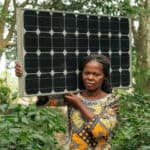Healthcare Cannot Exist Without Clean Water: Why WASH is the Foundation of an Effective Pandemic Response
Throughout much of the world, hospital beds and personal protective equipment like masks are seen as the basic elements of defense against COVID-19. Yet for many developing countries, the pandemic has exposed even more fundamental needs that are critical to disease prevention and treatment.
The U.S. Centers for Disease Control and Prevention estimates that 2.5 billion people worldwide—close to one-third of the global population—lack access to the improved sanitation required to maintain hygienic conditions at home. The challenge extends to many of the rudimentary healthcare facilities that provide the first line of care for so many people in developing countries. In the world’s least developed countries, only about half of the healthcare facilities have running water.
This grave shortage of such fundamental human services has long been recognized as a significant cause of illness, which leads to hundreds of thousands of preventable deaths worldwide every year, and accounts for approximately 9.1% of the global disease burden and 6.3% of all deaths. Today, during a global pandemic that has hand-washing as its hallmark shield, we are reminded that healthcare cannot exist without clean water or basic hygiene.
WASH: A Challenge that Goes Beyond COVID-19
This underlying water, sanitation and hygiene infrastructure is collectively referred to as WASH, and it is associated with many of the biggest challenges the world’s developing countries face. For instance, limited access to water and sanitation contributes to higher maternal mortality: Approximately 17 million women around the world give birth in facilities that lack adequate WASH services. And these challenges extend beyond substandard healthcare to include malnutrition, poverty and gender inequality. For example, in many developing countries, the task of gathering clean water for the family can take the better part of a day – and the responsibility often falls on women, limiting their ability to work outside the home and earn income.
U.S. International Development Finance Corporation (DFC) recognizes the impact of WASH on broader development goals. That’s why, as part of our commitment to supporting healthier and more productive communities, our investments in healthcare include not only hospitals and medical equipment but also expanded access to clean water and sanitation. As America’s development bank, DFC maintains a portfolio that has supported more than one million visits to hospitals and health clinics, as well as more than 100 billion liters of clean water.
Such large numbers illustrate the magnitude of the need. In 2016, the World Bank estimated that in some rural parts of the developed world, only about 20% of the population had access to clean water. It projected that annual investments of $28.4 billion would be required to meet the world’s water, sanitation and hygiene needs.
The Value of Development Finance in Building WASH Infrastructure
This staggering amount exceeds the resources of most governments and most developing country banks, which are often unwilling to finance such a steep investment in water infrastructure in markets considered risky. These numbers also underscore the value of development finance, in which government investments serve to mobilize additional private capital. Research tells us that every $1 invested in water and sanitation produces economic benefits ranging from $5 to $46. That’s why DFC has applied our WASH investment model around the world, launching major water infrastructure projects to help large cities serve growing populations, and to extend pipelines and other water and sanitation services to rural villages. For instance:
- In Jordan, DFC financing and political risk insurance supported the construction of a 200-mile pipeline that transports clean water from the Saudi border to Amman.
- In Kenya, a DFC credit guaranty enabled a local bank to provide financing to help a rural village upgrade the water pipes serving 100 schools and 50,000 residents.
- In El Salvador, where an estimated two-thirds of water systems need major capital investment, our financing is helping to build and restore a network of pipes, water pumps and storage tanks to improve the water supply for 300,000 people.
- And in India, we are helping more women and low-income borrowers obtain loans to make critical improvements to their homes, such as the addition of a permanent toilet.
While the COVID-19 pandemic has required a swift response, investments to make clean water and sanitation more widely available will ultimately create more resilient health systems that are better prepared to address future pandemics, as well as other infectious and chronic diseases. These investments will also boost preventive care and improve the quality of maternal and post-natal care. They are the building blocks of the healthier communities we are working to support around the world.
Nafisa Jiwani is Managing Director for Health Initiatives at U.S. International Development Finance Corporation (DFC), America’s development bank.
Photo courtesy of SuSanA Secretariat.
- Categories
- Coronavirus, Health Care, Investing, WASH



